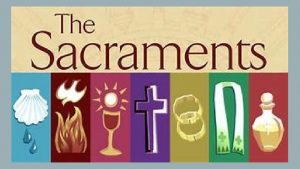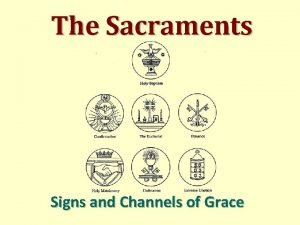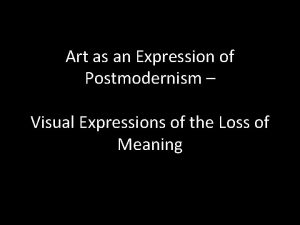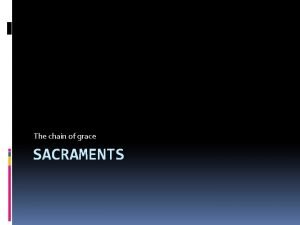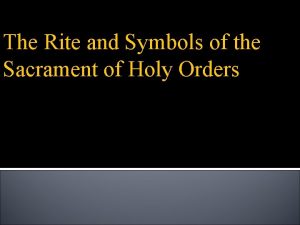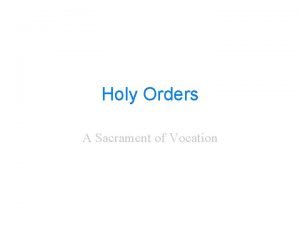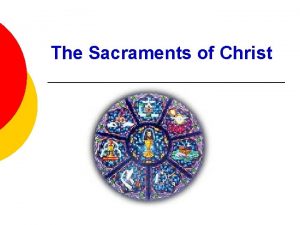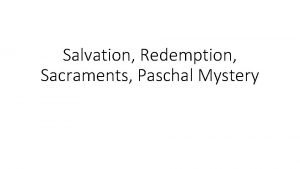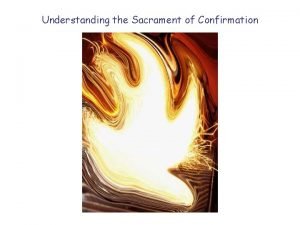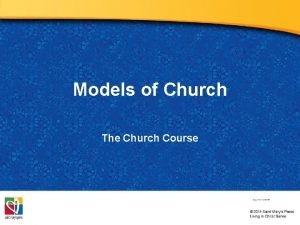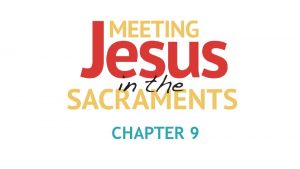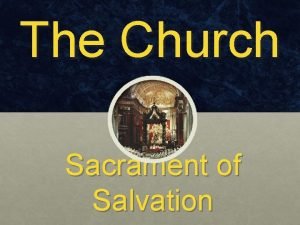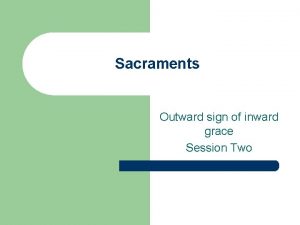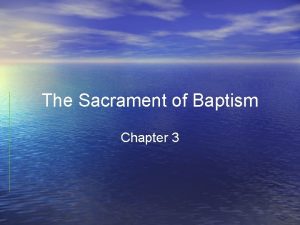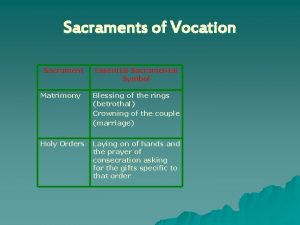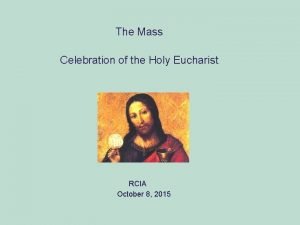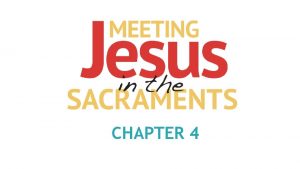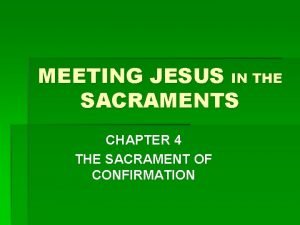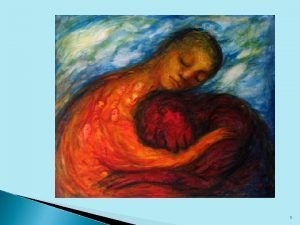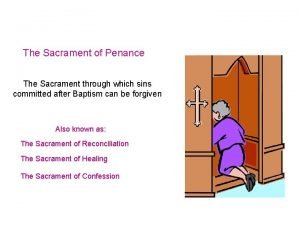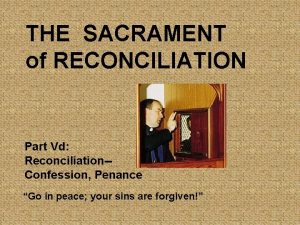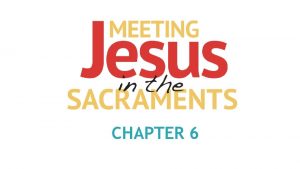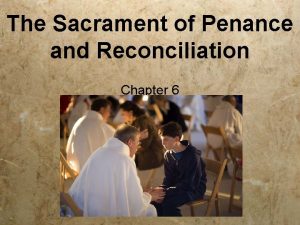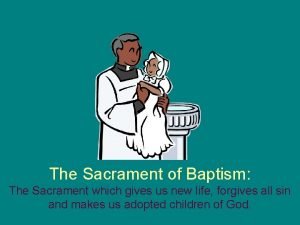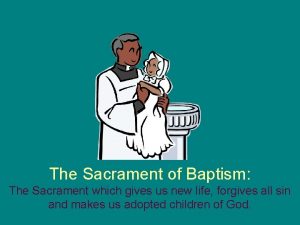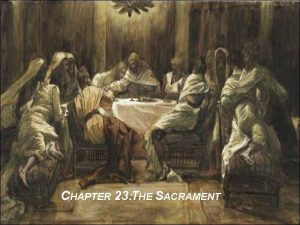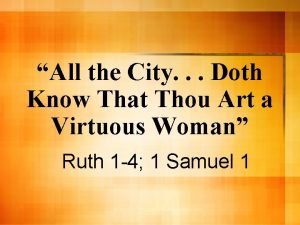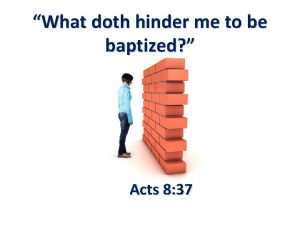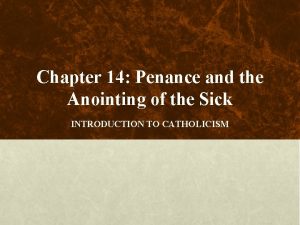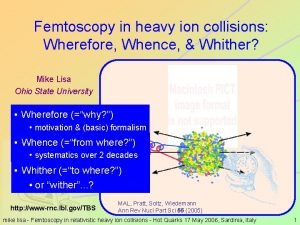The Sacrament of Penance From Whence Doth It



















































- Slides: 51

The Sacrament of Penance: From Whence Doth It Appear?

What did the early Church have that resembled Reconciliation? • Constantine We know the Emperor Constantine was baptized on his death bed, seeing baptism as the only major source of forgiving sins.

We have MANY sources alluding to priests forgiving sins • St. Augustine, St. Ambrose, St. Cyril and others wrote about priests forgiving sins. • But the WAY forgiveness was granted has changed A LOT over the centuries.

Order of Penitents • Christians who had committed grave sins (after baptism) were sometimes admitted to the Order of Penitents. • Forgiveness, in some places, was limited to once in a lifetime. • One could do penance for YEARS.


• The practice of PRIVATE, INDIVIDUAL confession, as we know it today, was spread from the Eastern part of the Christian world to Ireland, and the Irish monks brought it to Western Europe.

What we learn about forgiveness in the Gospels…

Pharisee and the Tax Collector/Two Debtors • To be forgiven, HUMILITY is required. The self-righteous are severely warned to be humble.

Healing of the paralytic; call of Levi (aka Matthew) • Jesus can heal not just the body, but He can also forgive sins. • He proves this by healing the paralytic’s body. • Matthew/Levi was a tax collector – meaning he worked for the enemy, and there’s a good chance he took extra. Jesus had no problem forgiving even someone who worked for Rome.

Lost Sheep/Lost Coin/Prodigal Son • God is DESPERATE for sinners to turn back to Him; rejoices when they do. • In the Prodigal Son parable, the older brother makes the incredible claim that he NEVER disobeyed his father. • He refers to himself as a slave (Jews saw God primarily as a law giver). • He refers to his brother as “your son” – represents treating “sinners” as less than the “righteous” • The Father corrects both views – that everything the father has is the son’s, and that he is “your brother”.

Forgiveness from the Cross • Mercy is so much a part of Jesus’ mindset that He can even forgive those who killed Him, not long after, but while He was on the cross.

Parable of the Unforgiving Servant • Before this parable, Peter asks Jesus if forgiving someone seven times is enough: Jesus responds seventy times seven times. • In the parable, the king forgives the equivalent of several BILLION dollars; the servant refuses to forgive a fellow servant THOUSANDS (a hundred days’ wages). • When the latter is mistranslated as a FEW DOLLARS, people interpret the parable to be against pettiness; rather, it is urging that we forgive HUGE amounts.

Woman Caught in Adultery • Jesus allows them to follow the law, and execute, but “Let he who has never sinned throw the first stone. ” • Starting with the oldest, the men who were going to kill her dropped their stones and left. • Jesus, after offering her pardon, tells her not to sin again. (The will to change is an important part of forgiveness. )

Zacchaeus and Peter are forgiven • Zacchaeus, the tax collector, tries to see Jesus, who then invites Himself to Zacchaeus’ home. • Zacchaeus offers to repay anyone he cheated FOURFOLD, and give HALF his wealth to the poor. • Peter is asked 3 times if he loves Jesus (after betraying Him 3 times). Each time, after Peter says “Of course I love you. ” (or some variation thereof), Jesus says some variation of “Feed my sheep. ” • In both passages, Jesus teaches that charity is an important part of forgiveness/conversion.

The Sacrament of Penance The idea that priests forgive sins goes back to the Gospels. • On Easter Sunday: “‘Peace be with you. As the Father has sent Me, so I send you. ’ When He had said this, He breathed on them and said to them, ‘Receive the Holy Spirit. If you forgive the sins of any, they are forgiven them; if you retain the sins of any, they are retained. ’” (Jn. 20: 21 -23) • (Mt. 16: 16 -19 is similar. )

(Review) • So forgiveness from the Church is there from the beginning, but the sacrament develops over time. • For about 6 centuries, public penance and the Order of Penitents (for grave sins, often a 1 -time opportunity). • Irish monks brought the practice of private confession from the East to the Western Church.

• Catholics believe in both temporal punishment (Purgatory) and eternal punishment (Hell), as a result of sins. • Reconciliation offers the remission of both by absolving sins (ABSOLUTION).

AKA • The sacrament is sometimes just referred to as “Confession”, “Penance”, “Reconciliation”, the Sacrament of Conversion, or the Sacrament of Forgiveness. • Remember that Conversion is a lifelong process, not a one-time event.

Adapting to different situations • One way the sacrament can be received is the “Rite for Reconciliation with Several Penitents with General Confession and Absolution”, aka General Absolution • This is for an extraordinary circumstance – like if you bought a ticket for the Titanic!

• We also have the “Rite of Reconciliation with Several Penitents with Individual Confession and Absolution”, aka the Communal Rite. • (This is often done in a school setting. Everyone says the Act of Contrition together, to save time, individually confess and receive absolution. )

• The most common form is the “Rite of Reconciliation with Individual Penitents”, or the “Individual Rite”, which we’ll focus on.

Preparation • Examination of conscience – people think about what sins they have committed since their last Confession • (The 10 Commandments are a common guide to reflect on this – although people can also look at where they have not been charitable enough, where they could be better to parents/children/siblings, etc. )

Reception of the Penitent • The priest welcomes the person, they make the Sign of the Cross

Reading of the Word of God (optional) • The priest may read a Scripture passage, to remind people of God’s role in it.

Confession of Sins/ Acceptance of Penance • “Bless me, Father, for I have sinned…” • The penitent is required to name all MORTAL sins; recommended we name VENIAL sins. (Venial sins are also forgiven at the reception of the Eucharist. )

• As a way of showing our sorrow for our sins, gratitude forgiveness, desire to live in peace w/ God and people, we say prayers, do works of mercy, love and justice, service, etc.

Penitent’s Prayer/Priest’s Absolution • At this point, the penitent says the Act of Contrition (“Oh, my God, I am sorry for my sins…”) • Contrition is “perfect” when it comes from love of God; “imperfect” when it comes from fear of hell. • Either includes a resolve to end one’s sinful ways.

• “God, the Father of mercies, through the death and resurrection of his Son, has reconciled the world to Himself and sent the Holy Spirit among us for the forgiveness of sins; through the ministry of the Church, may God give you pardon and peace, and I absolve you from your sins in the name of the Father, and of the Son, and of the Holy Spirit. ”

• With those words, the priest absolves a person of their sins. • This forgiveness comes from the God, and the priest is merely acting as an intermediary, like an ambassador.

Seal of Confession • The priest cannot, under any circumstances, reveal what he hears in Confession.



What about illness and death?

There are MANY healing stories in the Gospels. • To find the message (other than attesting to Jesus’ power), we must often look at the details. • The sacrament can be seen as early as the letter of James (5: 14)

For example, what does it mean that Jesus healed: • a Roman centurion’s servant? • a Samaritan leper? • a woman whose bleeding made her ritually unclean? • several people on the Sabbath? • the servant of one of the men arresting Him? • a man born blind (and assumed cursed by God to that life)?

What about illness and death? Illness and death are part of every person’s life journey. Everyone is invited to reach out with compassion to join with those who are ill or dying, just as Jesus did. God has revealed himself to be a God of compassion. Compassion is the quality of a person who so closely identifies with the suffering of another that the other’s suffering becomes their own.

What about illness and death? Jesus gave us the Sacrament of Anointing of the Sick. Through this Sacrament God offers us the graces to deal with our illness and the difficulties that accompany it. In this Sacrament we encounter the same Jesus who • grieved over Lazarus and raised him from death, • cleansed lepers, • healed the centurion's servant, • healed St. Peter’s mother-in-law, • healed the man paralyzed from birth, and many others.

Hope in the midst of suffering and pain Jesus’ healing miracles are signs of the healing and saving presence of the Spirit of God, who is always at work among us. Jesus’ healing miracles: § healed the whole person―body and soul; § offered healing for the unjust social structures that afflicted the people; § healed the suffering caused by social isolation; § strengthened people’s faith in God.

Hope in the midst of suffering and pain Jesus also suffered; much of Jesus’ suffering resulted from people’s spiritual blindness. Jesus’ suffering was also the consequence of his obedience to his Father and his love for humanity. All during his suffering Jesus reached out and found healing in the presence of his Father. Jesus’ greatest act of healing was his suffering and Death on the Cross. The healing and saving power of Jesus’ suffering and Death was revealed in the Resurrection.

Hope in the midst of suffering and pain The Resurrection is the source of our hope in the midst of the ongoing suffering and death that we experience. Suffering and death did not have the final say in Jesus’ life, and neither will they have the final say in our life. When we ‘take up our cross daily’ and unite our suffering with the suffering of Jesus, it gives us courage and strength to accept our suffering with dignity and hope. Hope is the desire and expectation of the salvation God promised. In the end, all suffering and death will be defeated.

When? Who? Where? How? The Sacrament of Anointing of the Sick is one of the Church’s two Sacraments of Healing. A priest can celebrate this Sacrament with an individual who is seriously ill or with a group of sick or elderly people. The Church celebrates this Sacrament wherever the seriously ill person may be; for example: § § § in the family home, in a hospital, in an assisted-living residence, in a hospice, at the scene of an accident.

When? Who? Where? How the Sacrament is celebrated outside of Mass: § The priest greets those present and invites them to reverence the Blessed Sacrament. § The priest celebrates the Sacrament of Penance with the sick person. § The priest proclaims the Gospel. (Liturgy of the Word) § The Liturgy of Anointing begins and those present are invited to join in a prayer of faith to express their trust in God. § The priest lays his hands on the head of the person receiving the Sacrament and anoints first the forehead and then the hands with the Oil of the Sick. § The priest concludes the Liturgy of Anointing with a prayer.

When? Who? Where? How? § While anointing the person’s forehead, the priest recites these words: Through this holy anointing may the Lord in his love and mercy help you with the grace of the Holy Spirit. § While anointing the person’s hands, the priest recites these words: May the Lord who frees you from sin save you and raise you up. § The distribution of Holy Communion then takes place. § Holy Communion received by those in danger of death is called Viaticum. § The celebration concludes with the blessing of all present.

The gifts of God’s healing presence Despair about life is the loss of hope in the saving and healing power of God. The risen Lord does not abandon us in moments of illness or suffering. His healing power is always at work in our lives. Through the Sacrament of Anointing of the Sick, the Holy Spirit offers the sick person the gifts of strength, peace and courage. These graces strengthen the person to fight against the effects of the illness and against the temptation to lose faith and hope and to despair.

The gifts of God’s healing presence The Sacrament of Anointing of the Sick also brings to the sick and suffering. . § § union with Christ in his Passion forgiveness of sins restoration to health, if God wills it preparation for passing over to eternal life Christians must become the hands of Christ touching the sick and dying, bringing his healing presence to those who need it most.

Blessed Jose Olalla Valde s (1820 -89) and the Hospitaller Brothers of St. John of God (1495– 1550) Blessed Jose Olalla Valde s was born in Havana, Cuba on February 12, 1820. His passion for serving the poor inspired him to join the Hospitaller Brothers of St. John of God, a community which today cares for the sick and dying in fifty-one countries, including the United States. Brother Jose served the sick and poor at Camaguey, Cuba for fifty-four years. He became legendary for his skill first as a nurse and then as a surgeon, for his knowledge of homeopathic medicines and for his talent for resolving disputes among townspeople.

Vocab 1. Absolution - The act of the priest in the Sacrament of Penance and Reconciliation, using the power of Christ entrusted to the Church, by which he assures the penitent of God's forgiveness. 2. Anointing of the Sick - This Sacrament of healing is given to a person who is seriously ill or in danger of death due to sickness or old age. Elderly people may be anointed if they are in weakened condition though no dangerous illness is present. 3. Compassion - In the Bible, the English word ___ is a translation of a Greek word meaning 'womb' and of a Hebrew word that is also translated as 'mercy'. ___ is the quality of a person who so closely identifies with the suffering and condition of another person that the suffering of the other becomes their own, 'enters their womb'. The Latin roots of the English word ___ are cum and patior, which mean 'suffering with'. 4. Confession - An essential element of the Sacrament of Penance and Reconciliation, which consists in telling one's sins to the priestly minister. By extension, the word ____ is used to refer to the Sacrament of Penance itself. 5. Contrition - Sorrow for one's sin with a firm purpose of amendment, which is the intention to avoid sin in the future. _____ is imperfect when a person is motivated by fear of punishment. _______ is perfect when the motive is a response to God's love for us. _______ on the part of the penitent, either imperfect or perfect, is a necessary part of the Sacrament of Penance and Reconciliation.

• • • Conversion - turning around one's life toward God and trying to live holier lives according to the Gospel. Eternal punishment - Life after death in Hell. Grace - Coming from the Latin word meaning 'free', this is the free and undeserved gift of God's love to us. God shares his divine life and friendship with us. God's ____ is ever at work in our lives, helping us to live as children of God and disciples of Jesus. An old proverb runs, 'There is an ebb to every tide, except the tide of God's grace. ' God's ___, his effective love, is always at high tide in our lives. Hope - 'The Theological Virtue through which a person both desires and expects the fulfillment of God's promises of things to come. ' ___ is the desire and expectation of the salvation God promised. It is based on God's unwavering fidelity to keeping and fulfilling his promises. Lament - A ___ is a Hebrew verse form that is used for poetic elegies, psalms of suffering or anguish, and other treatments of painful parts of the human condition. The Book of Lamentations and many psalms are in the form of laments.

• • • Mercy - The loving kindness, compassion, or forbearance shown to one who offends; for example, the _____ of God to us sinners. Miracles - ___ are signs of the presence of God at work among us. 'The ___ and other deeds of Jesus are acts of compassion and signs of the Kingdom and salvation'. Mortal sin - A grave infraction of the law of God that destroys the divine life in the soul of the sinner (sanctifying grace), constituting a turn away from God. For a sin to be mortal, three conditions must be present: grave matter, full knowledge of the evil of the act, and full consent of the will. Oil of the sick - Oil blessed by the bishop in Holy Week to be used for the Sacrament of Anointing of the Sick. In necessity, a priest may also bless this oil. Penance and Reconciliation - The Sacrament of ______ is the sacrament in which sins committed after Baptism are forgiven. It results in reconciliation with God and the Church.

• • • Reparation - Making amends for a wrong done or for an offense, especially for sin, which is an offense against God. By his death on the cross, the Son of God offered his life out of love for the Father to make reparation for our sinful disobedience. We are obliged to make reparation for personal sins against justice and truth, either through restitution of stolen goods or correcting the harm done to the other's good name. Sacramental graces - Gifts of the Holy Spirit (received in the sacraments) to help us live out our Christian vocation. Sacraments of healing - Penance and Reconciliation, and Anointing of the Sick. Christ, the physician of our soul and body, instituted these sacraments because the new life that he gives us in the sacraments of Christian initiation can be weakened and even lost because of sin. Therefore, Christ willed that his Church should continue his work of healing and salvation by means of these two sacraments. Seal of confession - The confessor's obligation to keep absolutely secret what a penitent has told to him in the Sacrament of Penance; also known as the 'sacramental seal'. Social sins - Sins that produce unjust social laws and oppressive institutions. They are social situations and institutions contrary to divine goodness. Sometimes called "structures of sin" they are the expression and effect of personal sins.

• • • Temporal punishment - Purification of the unhealthy attachment to creatures, which is a consequence of sin that remains even after death. We must be purified either during our earthly life through prayer and a conversion which comes from fervent charity, or after death in Purgatory. The eleven The name given to the apostles after Judas Iscariot betrayed Jesus and died and before Matthias was elected. Theological virtues - These are the 'gifts infused by God into the souls of the faithful to make them capable of acting as his children and of meriting eternal life'. The ___ are faith, hope, and charity (love). Venial sin - A less serious offence than a mortal sin. Viaticum - Holy Communion received during the celebration of the Eucharist by a person who is in danger of death is called ___, or 'the spiritual food for one’s passing from this world to the Father'.
 O sacrament most holy oh sacrament divine
O sacrament most holy oh sacrament divine Baptism matter
Baptism matter Penance matter
Penance matter From whence comes my help
From whence comes my help What whence whither painting
What whence whither painting Thunder and lightning in macbeth
Thunder and lightning in macbeth Themes of romeo and juliet
Themes of romeo and juliet Sleeping in my orchard a serpent stung me
Sleeping in my orchard a serpent stung me And the continuance of their parents’ rage translation
And the continuance of their parents’ rage translation V
V What is the sacramental principle
What is the sacramental principle Symbol for holy orders
Symbol for holy orders Sacrament of vocation
Sacrament of vocation What is sacrament
What is sacrament Matthew 9 35
Matthew 9 35 Paschal mystery definition
Paschal mystery definition Meeting jesus in the sacraments pdf
Meeting jesus in the sacraments pdf Sacrament of vocation
Sacrament of vocation Golden ratio the last supper
Golden ratio the last supper Confirmation sacrament
Confirmation sacrament Confirmation sacrament symbols
Confirmation sacrament symbols The sacrament of the eucharist chapter 5
The sacrament of the eucharist chapter 5 Avery dulles models of the church chart
Avery dulles models of the church chart The sacrament of matrimony chapter 9 crossword
The sacrament of matrimony chapter 9 crossword The church sacrament of salvation chapter 3 study questions
The church sacrament of salvation chapter 3 study questions Mysterion sacramentum
Mysterion sacramentum When do we renew our baptismal promises
When do we renew our baptismal promises Symbols of matrimony
Symbols of matrimony Sacrament prayer bread
Sacrament prayer bread The sacrament of confirmation chapter 4
The sacrament of confirmation chapter 4 Meeting jesus in the sacraments chapter 2
Meeting jesus in the sacraments chapter 2 Môn thể thao bắt đầu bằng chữ đua
Môn thể thao bắt đầu bằng chữ đua Hát kết hợp bộ gõ cơ thể
Hát kết hợp bộ gõ cơ thể Khi nào hổ mẹ dạy hổ con săn mồi
Khi nào hổ mẹ dạy hổ con săn mồi điện thế nghỉ
điện thế nghỉ Dạng đột biến một nhiễm là
Dạng đột biến một nhiễm là Nguyên nhân của sự mỏi cơ sinh 8
Nguyên nhân của sự mỏi cơ sinh 8 Trời xanh đây là của chúng ta thể thơ
Trời xanh đây là của chúng ta thể thơ Phản ứng thế ankan
Phản ứng thế ankan Voi kéo gỗ như thế nào
Voi kéo gỗ như thế nào Thiếu nhi thế giới liên hoan
Thiếu nhi thế giới liên hoan Fecboak
Fecboak Một số thể thơ truyền thống
Một số thể thơ truyền thống Thế nào là hệ số cao nhất
Thế nào là hệ số cao nhất Sơ đồ cơ thể người
Sơ đồ cơ thể người Ng-html
Ng-html Số nguyên là gì
Số nguyên là gì đặc điểm cơ thể của người tối cổ
đặc điểm cơ thể của người tối cổ Mật thư anh em như thể tay chân
Mật thư anh em như thể tay chân Các châu lục và đại dương trên thế giới
Các châu lục và đại dương trên thế giới Glasgow thang điểm
Glasgow thang điểm ưu thế lai là gì
ưu thế lai là gì

